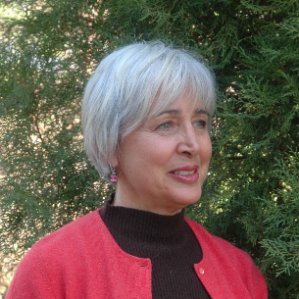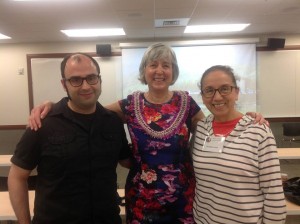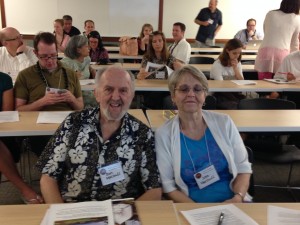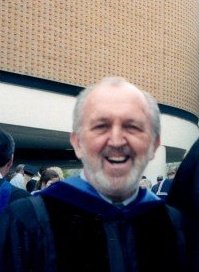The Association for Mormon Letters is pleased to present two lifetime awards, to Phyllis Barber and Donald Marshall, at the AML Conference on March 4, 2016, at BYU Hawaii. This announcement includes summaries of each person’s literary career. Full citations addressing the quality of each person’s work will be presented at the conference, and published soon thereafter. Both Phyllis and Don will be attending the conference.
The Smith-Pettit Foundation Award for Outstanding Contribution to Mormon Letters will be awarded to Phyllis Barber.
 Phyllis Barber was born in 1943 in Basic Townsite, present day Henderson, Nevada, and was raised in Boulder City and Las Vegas. She studied at Brigham Young University, then received a music degree from San Jose State College, where she majored in classical piano. She began attending University of Utah Writing Workshops in 1980, and received a Master of Fine Arts degree in creative writing form Vermont College in 1984. She taught in Vermont College’s Writing Program from 1990 until retiring in 2010. She is a co-founder of the Writers at Work Conference in Park City, Utah, and continues to teach personal essay and memoir classes in Park City. She was inducted into the Nevada Writers Hall of Fame in 2005.
Phyllis Barber was born in 1943 in Basic Townsite, present day Henderson, Nevada, and was raised in Boulder City and Las Vegas. She studied at Brigham Young University, then received a music degree from San Jose State College, where she majored in classical piano. She began attending University of Utah Writing Workshops in 1980, and received a Master of Fine Arts degree in creative writing form Vermont College in 1984. She taught in Vermont College’s Writing Program from 1990 until retiring in 2010. She is a co-founder of the Writers at Work Conference in Park City, Utah, and continues to teach personal essay and memoir classes in Park City. She was inducted into the Nevada Writers Hall of Fame in 2005.
Barber is best known for her personal essays, memoirs and short stories, and has also published a novel and two children’s books. Her first published work was a children’s book, Smiley Snake’s Adventure, published in Provo in 1980. In the 1980s she began to have short stories and personal essays published in such periodicals as Kenyon Review, Missouri Review, Fiction International, Cimarron Review, Crazyhorse, Dialogue, Sunstone and many more. Her early short stories were collected in The School of Love (University of Utah Press, 1990). One of the stories in that collection, “Criminal Justice”, won a Utah Fine Arts Literary Competition, as well as a Distinguished Western Story Award, for which it was anthologized in Crosscurrents. Next came the novel And the Desert Shall Blossom (University of Utah Press, 1991), the children’s book Legs: The Story of a Giraffe (M. K. McElderry Books, 1991) and How I Got Cultured: A Nevada Memoir(University of Georgia Press, 1992). The last book received an AML Award in Autobiography and an Award for Creative Nonfiction from the Associated Writing Programs.
 In 1999 her second short story collection, Parting the Veil: Stories from a Mormon Imagination, was published by Signature Books. One story, “Mormon Levis”, won first place in the Sunstone K.K. and Brookie Brown Short Story Contest, 1996. Since 1999 she has turned to the genre of personal essay and memoir. Raw Edges: A Memoir, published by the University of Nevada Press in 2010, was listed as an Outstanding University Press Book in Foreword Reviews Magazine. To The Mountain: One Mormon Woman’s Search For Spirit was published by Quest Books in 2014, completing her trilogy of memoirs. Two of the essays in the collection were cited as Notable in Best American Essays, and one was cited as Notable in Best American Travel Writing 2011. The collection was a finalist for the 2013 AML Creative Non-Fiction Award. She is currently working on a second novel, about abolitionists, missionaries, and southern Nevada.
In 1999 her second short story collection, Parting the Veil: Stories from a Mormon Imagination, was published by Signature Books. One story, “Mormon Levis”, won first place in the Sunstone K.K. and Brookie Brown Short Story Contest, 1996. Since 1999 she has turned to the genre of personal essay and memoir. Raw Edges: A Memoir, published by the University of Nevada Press in 2010, was listed as an Outstanding University Press Book in Foreword Reviews Magazine. To The Mountain: One Mormon Woman’s Search For Spirit was published by Quest Books in 2014, completing her trilogy of memoirs. Two of the essays in the collection were cited as Notable in Best American Essays, and one was cited as Notable in Best American Travel Writing 2011. The collection was a finalist for the 2013 AML Creative Non-Fiction Award. She is currently working on a second novel, about abolitionists, missionaries, and southern Nevada.
Margaret Blair Young and Eric Freeze wrote,
Many of us in the Mormon Letters community have known or known of Phyllis Barber from the time she wrote her first novel, And the Desert Shall Blossom, or her first short story collection, School of Love. The rest of America got a glimpse of her (and thousands doubtless fell in love with her at once) when she appeared on the “Today Show” talking about her brilliant memoir, How I Got Cultured. Though usually self-effacing, Phyllis came onto the literary scene with elegance and style and let others know that she was a part of the artistic community, celebrating what each of us contributed.
 Those of us who got to know her and her many journeys, some of them beautifully described in her memoirs Raw Edges and To The Mountain: One Mormon Woman’s Search For Spirit, quickly recognized her as a true story maker, gifted equally with word-smithing and with love.
Those of us who got to know her and her many journeys, some of them beautifully described in her memoirs Raw Edges and To The Mountain: One Mormon Woman’s Search For Spirit, quickly recognized her as a true story maker, gifted equally with word-smithing and with love.
Her fiction has been honored in too many places and with too many awards to mention all of them now. Suffice it to say, her work has influenced literary conferences in Spain and small group settings in which she has performed her encounter dances, evoking memories or emotions from those who accept her ability to transcend many kinds of walls.
Phyllis is an activist, a healer, an artist, and a deeply compassionate and giving human being. Her continued dialogue with art and Mormonism shows the challenges and triumphs of being a Mormon woman artist, and she has laid the groundwork for a new generation of Mormon writers.
The Association for Mormon Letters Lifetime Achievement Award will be presented to Donald R. Marshall.
Donald R. Marshall was reared in Panguitch, Utah. He began his writing career early, winning, at fifteen, a silver medal in The Deseret News for “excellence in writing and art.” He graduated from BYU in 1960 with a Bachelor’s degree in Art and in 1965 with a Master’s degree in American Literature. His Ph.D. is from the University of Connecticut in American Literature. He self-published his first short story and poetry collection, The Rummage Sale, in 1972. Its success led to it being republished by Peregrine Smith, 1975; Deseret Book, 1985; and Tabernacle Books, 1999. Marshall turned the stories from that collection into a stage musical, for which he wrote the script, music, and lyrics, and played the accordion, organ, and synthesizer for the taped instrumental accompaniment. It was presented by the Promised Valley Playhouse, at Salt Lake City’s Shire West Theater, under the direction of Beverly Booth Rowland in 1979. He staged his own production the following year at the SCERA Shell in Orem and at Brigham Young University. The short story “The Week-end,” from The Rummage Sale, was included in the anthologies A Believing People (Brigham Young University Press, 1974) and Bright Angels and Familiars (Signature Books, 1992).
Marshall’s second collection of stories, Frost in the Orchard (Brigham Young University Press 1977; Deseret Book, 1985) won an AML award for fiction in 1978. One story from the collection, “Christmas Snows, Christmas Winds”, was made into the short movie Christmas Snows, Christmas Winds. It was directed by Sterling Van Wagenen and produced by Brigham Young University. It played seasonally on PBS for many years.
His story, “Lavender Blue,” was published in Sunstone (March-April 1981) and in Greening Wheat: Fifteen Mormon Stories (Orion Books, 1983). He is also the author of a novel, Zinnie Stokes, Zinnie Stokes (Deseret Book, 1984), and a children’s novel, Enchantress of Crumbledown, (Deseret Book, 1990). Other writing awards include first place in the 1988 Utah Arts Council Contest, first place in the 1989 Deseret Book Children’s Book Contest, and the 2005 Marilyn Brown Novel Award Honorable Mention. He has also won awards in painting, photography, composing, directing, and set designs. Marshall took over the BYU College of Humanities’ International Cinema in 1975, and managed the program until he retired in 2000. As part of that job, he traveled to film festivals and arthouses, spotting new films he could bring to the campus. Marshall currently enjoys retired life in Provo with his wife, Jean.
Jon Green, Donald’s long-time colleague at BYU, who is currently serving a mission, wrote this appreciation:
When I was asked to write an award citation about “the nature of Donald Marshall’s literary and academic career,” my brief reply captures the essence of what and who Don Marshall is to me: “I will try to fill in the spaces of your flurry of fascinating facts about Don’s stellar career with some anecdotal music to reveal the real Don Marshall that I knew and loved. He was and is an original, a true Mormon Renaissance Man.”
 It is common knowledge that being a Renaissance Man implies a person exceptionally gifted in many fields. What is uncommon is that Don is a rarer bird or, more properly said, an amphibian, as much at home in the studio creating works of art as he is in the classroom, critiquing works of art. His dual skills bring to both domains an unusual richness, which I experienced first-hand when we team-taught the large Humanities 101 Introduction to the Arts course in the old 2084 JKHB. This room was also the original home of BYU’s International Cinema, which Don raised to an international platform for great films. A noted film critic once wrote: “There are two places where you can see the world’s best art films: at Cannes, France, and in Provo, Utah.”
It is common knowledge that being a Renaissance Man implies a person exceptionally gifted in many fields. What is uncommon is that Don is a rarer bird or, more properly said, an amphibian, as much at home in the studio creating works of art as he is in the classroom, critiquing works of art. His dual skills bring to both domains an unusual richness, which I experienced first-hand when we team-taught the large Humanities 101 Introduction to the Arts course in the old 2084 JKHB. This room was also the original home of BYU’s International Cinema, which Don raised to an international platform for great films. A noted film critic once wrote: “There are two places where you can see the world’s best art films: at Cannes, France, and in Provo, Utah.”
Don and I were probably meant to be together, since our paths crossed very early. I arrived at BYU out of grad school in the fall of 1970. Don was hired the next year. For the next 30+ years we shared contiguous offices in the Humanities Department and a fierce loyalty to Hum 101, which we considered an indispensable G.E. conversion course to inspire students to learn how to love the Good, the True and the Beautiful. We made sure that we learned the name of each of our 300 students during the course of the semester. We both take some credit for the success of one of our more noteworthy students in that class, Brad Wilcox.
Concerning his creative gifts as a writer of fiction, I feel it a singular privilege to have been with Don when he was writing some of the stories for his first collection of Mormon stories, The Rummage Sale, while we spent a couple of weeks in Baker National Park in the summer of 1973. We camped for a couple of days by a waterfall on our trip in his VW bus where I learned first-hand the powerful influence Gustav Flaubert’s modus operandi as a writer had on Don’s writing. Don considered “le mot juste” the irreducible essence of good writing. He would struggle for hours to get a line “just right” before going on to the next sentence. When he took his self-published book to the BYU Bookstore, they agreed to sell it but didn’t know where to put it. There was no shelf for Mormon Fiction. This fact alone speaks volumes about Don’s pioneering efforts in laying the foundation for what has become an avalanche of works of Mormon fiction.
The one character trait that most endears him to me is his infectious joi de vivre, which every one of his former students will attest to with equal enthusiasm. I could tell many stories to illustrate this, but this one is my favorite. Don and I attended the annual MLA convention in New York City one year in the eighties and stayed at the famous Algonquin Hotel. We had one evening free and were delighted that the Met was performing Wagner’s Tristan und Isolde. Don, ever wanting to fill his culture cup to overflowing, found another equally appealing offering, a shortened version of Bizet’s Carmen that was premiering just across the street from the Met that same evening. I had resigned myself to one or the other, but Don came up with a very creative solution. We would watch Act I of Tristan and at the intermission we would sprint across the street and take in the shortened version of Carmen, and then rush back in time for the third act of Tristan. To my amazement it actually worked. I will never forget the elation we felt to “drink life to the lees,” as Tennyson’s Ulysses did. Tennyson could have been describing Don Marshall, who many times has said or thought:
“’Tis not too late to seek a newer world. . . , To sail beyond the sunset. . . , To follow knowledge like a sinking star, Beyond the utmost bound of human thought.”



Congratulations!